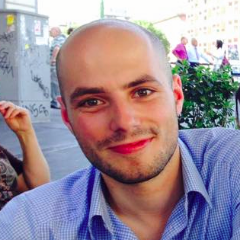Why do Donizetti's Tudor operas seem to invite staid period interpretations? At the end of March, Marie-Louise Bischofberger's inert Bordeaux production of Anna Bolena raised boos at La Scala. Now, Alfonso Antoniozzi's uninspired new production of Maria Stuarda has arrived at Genoa's Teatro Carlo Felice. One might have hoped for a memorable performance for the work's absolute première at the Carlo Felice. Instead, this was an experience to quickly forget.
Gianluca Falaschi's garish period costumes set us in Tudor times. Antoniozzi evokes a play within a play by having stagehands move parts of the set between scenes. Apart from that there is little in the way of direction. But the few additional interventions Antoniozzi does make are odd. He conscientiously litters the stage with the trappings of opera at its most histrionic – the very stuff that makes us fall in love with the art form, he claims – as if harking back to a bygone golden age. Singers cast in the “park and bark” mould roll out stock gestures at such a rate that even Donizetti would have raised an eyebrow. Precisely what Antoniozzi is trying to convey is unclear, especially when he gives the impression that he is unable to take Maria Stuarda seriously. His decision to cast the male roles in dresses is peculiar, and it comes across as a sneer. The director surely raised more titters when, as a respected baritone, he built his reputation singing buffa roles.
Some of the singing was not much better. Elena Moşuc is considered a leading bel canto soprano in Italy, and here she displayed some familiar diva stereotypes – hands quivering dramatically in “Ah! se un giorno da queste ritorte”, she swooned precariously and staggered down a central block of stairs. Maria is a role that sounds best spun in a lustrous legato, but Moșuc's lumpy delivery, comprising wayward vibrato and clumsy scoops, had the consistency of clotted cream, and her sound was doubly heavy in the boomy acoustic of this marble-walled theatre. Celso Albelo, the Roberto in a frock, issued robust top notes and impressed in the spry duet “Ah! rimiro il bel sembiante”. Elsewhere, his singing was sluggish, unsupported and consistently under the note.
It was therefore a relief that Spanish mezzo-soprano Silvia Tro Santafé commanded the stage as Elisabetta. Her stylish legato, sharp Italian and laser-like coloratura made “Ah! dal ciel discenda un reggio” a standout number. Stefano Antonucci's Cecil and the resounding Andrea Concetti's Talbot were also solid. When the latter handed Elizabeth her death warrant in “Quella vita a me funesta”, the dramatic tension went up a notch.
The revelation of the evening was Ukrainian conductor Andriy Yurkevych, making his debut at the Carlo Felice. His fleet-footed reading delighted in the finer details, and the orchestra, which ducked, weaved and exploded when least expected, sounded a fine bel canto vehicle in his hands. The tight chorus sang with vigour and bite. Such were welcome compensations, though they could not salvage this dispiriting performance.




